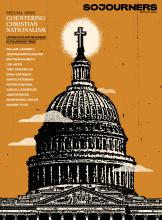
Illustrations by Ben Jones
How Christians Can Counter Christian Nationalism
WEAPONIZED CHRISTIAN NATIONALISM seeks a “Christian” government that would erode civil rights and undercut election integrity and democratic principles. It endorses the use of violence to obtain or maintain power; embraces white supremacy; and distorts Christian language, symbols, and identity into tools for political manipulation and gain.
At the same time, beliefs about “God and country” exist on a wide spectrum. White Christian nationalism is sometimes supported by people who are not white. And stifling all participation by people of faith in public life is not a suitable alternative to nationalism.
In other words: It’s complicated. You’re not alone if you are confused, concerned, or dismayed by these topics. But hopeful action is possible. The following short essays by scholars, pastors, and activists offer insights on Christian nationalism and how to dismantle it. —The Editors
Prophetic Faith
by William J. Barber III
IF FAITH WERE not powerful, people in power would not invest so much to manipulate it for their own interests. When we oppose Christian nationalism, we must begin with a recognition of the power of faith.
Faith has the power to bring us together and build up a democracy where everyone can thrive. Every movement toward a more perfect union in our nation’s past has been powered and sustained by deep faith traditions. We need to learn from the faith of Frederick Douglass, Sojourner Truth, and William Lloyd Garrison; Martin Luther King Jr., Dorothy Day, and Ella Baker. This rich theological heritage helps us guard against the forces that distort Christianity to justify extremism. But it also prepares us to practice prophetic faith in our own lives and ministries.
“Woe unto you who legislate evil and rob the poor of their right,” the prophet Isaiah declares. In his first sermon, recorded in Luke 4, Jesus takes up Isaiah’s scroll to proclaim “good news to the poor.” Any alternative to the religious nationalism that calls itself “Christian” must embody this prophetic proclamation for the 135 million Americans who are poor or low-income today. As the divide between the super-rich and the poor has grown wider in the U.S. over the past half century, poor communities have been offered divisive culture wars and the false hope of an individualistic prosperity gospel.
In a time of extreme inequality, Ezekiel says God looked for someone to stand in the gap but found none. Several chapters later, though, God sends Ezekiel to prophesy to a valley of dry bones. There Ezekiel witnesses the power the rejected have when they come together and rise up as a nonviolent army.
Poor people in the United States today are the largest swing vote in national elections. If they unite around an agenda, they have the power to reconstruct American democracy. God has seen fit to ordain those who have been rejected in this world to lead the revival of love, justice, and mercy that we so desperately need. We embody an alternative to religious nationalism when we join God in this work.
Read the Full Article

Got something to say about what you're reading? We value your feedback!

